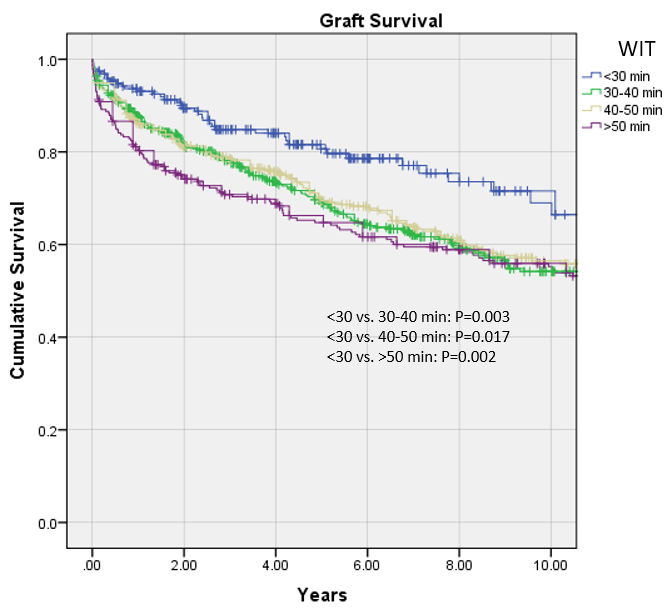Short Recipient Warm Ischemia Time Improves Graft Survival in Liver Transplantation from Donation after Brain Death: 20-Year Experience of Liver Transplantation
Transplant Institute, Henry Ford Hospital, Detroit, MI
Meeting: 2020 American Transplant Congress
Abstract number: 38
Keywords: Graft survival, Ischemia, Warm ischemia
Session Information
Session Time: 3:15pm-4:45pm
 Presentation Time: 4:15pm-4:27pm
Presentation Time: 4:15pm-4:27pm
Location: Virtual
*Purpose: Although the correlation between warm ischemia time (WIT) and the outcomes of liver transplantation has been extensively studied, few investigations have focused on the effect of recipient short WIT on outcomes of liver transplantation in donation after brain-death (DBD) donors.
*Methods: Our institutional Transplant Surgery Database was retrospectively queried to identify patients who underwent primary DBD liver transplantation between 2000 and 2019. Patients were divided according to recipient WIT (≤30, 31-40, 41-50 and >50 minutes), and short- and long-term graft survival was assessed. Graft survival was compared by a log-rank test and risk of graft loss was assessed using a Cox regression multivariate model.
*Results: During the study period, 1,256 DBD liver transplants were performed. These patients had a mean age of 55.1±9.7 and 65.7% were males. The mean pretransplant MELD score was 28.8±8.9. Recipient WIT was ≤30 minutes in 195 patients (15.5%), 30 – 40 minutes in 468 patients (37.3%), 40 – 50 minutes in 353 patients (28.1%) and >50 minutes in 240 patients (19.1%). A recipient WIT≤30 minutes correlated with a significant graft survival advantage at 1-, 3-, 5-, and 10-year intervals (Figure 1). One-year graft survival in patients with WIT ≤30 minutes was superior to that in patients with WIT 30-40 minutes (93.3% vs. 87.7%, respectively, P=0.04), that of patients with WIT 40-50 minutes (93.3% vs. 86.4%, P=0.019) and that of patients with WIT > 50 minutes (93.3% vs. 80.8%, P<0.001). Upon multivariate analysis, with adjustment for donor factors, recipient factors and year of transplantation, WIT≤30 minutes remained a significant predictor of superior graft survival when compared to the other groups (Table 1).
*Conclusions: Shorter recipient WIT in DBD liver transplants is associated with superior short and long-term graft survival. WIT should be kept within 30 minutes when feasible.
| WIT | P-Value | HR (95% CI) |
| ≤30 vs. 31-40 min | 0.039 | 2.15 (1.04-4.45) |
| ≤30 vs. 41-50 min | 0.045 | 2.16 (1.02-4.60) |
| ≤30 vs. >50 min | 0.005 | 3.10 (1.42-6.77) |
To cite this abstract in AMA style:
Al-Kurd A, Kitajima T, Delvecchio K, Elsabbagh AM, Yeddula S, Rizzari M, Collins K, Yoshida A, Abouljoud M, Nagai S. Short Recipient Warm Ischemia Time Improves Graft Survival in Liver Transplantation from Donation after Brain Death: 20-Year Experience of Liver Transplantation [abstract]. Am J Transplant. 2020; 20 (suppl 3). https://atcmeetingabstracts.com/abstract/short-recipient-warm-ischemia-time-improves-graft-survival-in-liver-transplantation-from-donation-after-brain-death-20-year-experience-of-liver-transplantation/. Accessed February 27, 2026.« Back to 2020 American Transplant Congress

